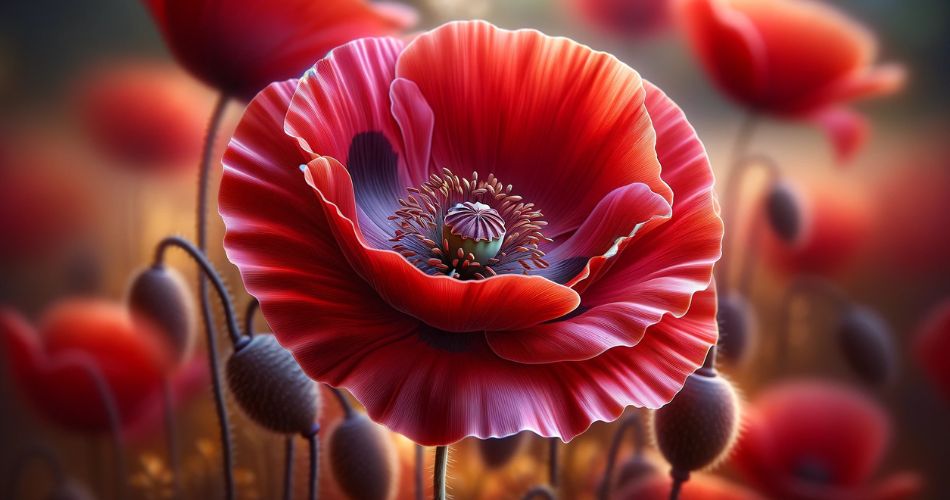Briefly
Poppy flower, throughout time, has come to symbolize a multitude of concepts such as sleep, peace, and death due to its sedative effect and the vivid and strong color that symbolizes the blood of fallen warriors. In a more positive light, it also represents remembrance and consolation in times of loss. In the field of romantic relationships, a red poppy signifies pleasure, while a white poppy is associated with consolation, and a yellow poppy symbolizes wealth and success.
Poppy Flower in Dreams
In the realm of dreams, seeing a poppy flower can symbolize a need for rest or recuperation. It may indicate that the dreamer is seeking peace and tranquility, or is in need of respite from difficulties or stress. Psychologically speaking, dreaming about poppy flowers may also represent a fear of oblivion or being forgotten.
- Need for rest or recuperation
- Seeking peace and tranquility
- Fear of oblivion or being forgotten
Poppy Flower in Myths and Folklore
In Greek mythology, poppy flowers were associated with Demeter, the goddess of agriculture and fertility, who created the poppy for the purpose of getting some rest from her tireless searching for her daughter, Persephone. In Roman tales, poppies were used as offerings to the dead. Owing to its connection with sleep and oblivion, poppies were often depicted in art and literature as a means to symbolize sleep, death, and peace.
In another context, in Eastern folklore, poppies symbolized love and were believed to bloom along the paths of lovers. They were also associated with messages delivered in dreams.
- Connection with fertility and agriculture
- Symbol of sleep, death, and peace
- Representation of love and dream messages
Poppy Flower Spiritual Meanings
In a spiritual context, the poppy flower is often viewed as a symbol of sacrifice, particularly remembering those who have given their lives in battle. Its vibrant red color serves as a poignant reminder of the blood shed by soldiers. Additionally, it holds a spiritual significance of resurrection and eternal life, drawing parallels to the cycle of life and death, reminding us of the transient nature of physical existence.
- Symbol of sacrifice and remembrance
- Represents resurrection and eternal life
- Reminder of life’s transient nature
Poppy Flower Tattoo Meaning
A poppy flower tattoo often embodies a range of meanings depending on the individual’s personal interpretation. However, common themes include remembrance and respect for soldiers who have fallen in war, echoing the symbolism of the red poppies in Flanders fields. More personally, it could represent a struggle overcome, a lost love, or a reminder of mortality and the fleeting nature of life.
- Remembrance and respect for fallen soldiers
- Representation of overcoming struggles
- Symbol of lost love or mortality
FAQ
What does a poppy flower symbolize?
A poppy flower symbolizes sleep, peace, death, remembrance, and consolation. In relationships, a red poppy signifies pleasure, a white poppy symbolizes consolation, and a yellow poppy stands for wealth and success.
What is the deeper meaning of poppies?
On a deeper level, poppies symbolize the sacrifice of soldiers in war, resurrection, and eternal life. They remind us of the transient nature of our physical existence.
What does a poppy flower tattoo mean?
Poppy flower tattoos often signify remembrance and respect for fallen soldiers. They can also symbolize personal struggles that have been overcome, lost love, or a reminder of mortality.
What is the meaning of the black poppy flower?
The black poppy flower is generally associated with remembrance of the African, black and Caribbean communities’ contribution to the war effort. It stands as a symbol of their sacrifices and the often overlooked role they played.

Reviewed by Alexander Lys, M.L., a specialist in the field of symbolism research and dream psychology. A certified participant in numerous psychological seminars and courses, the author of hundreds of articles on psychology, including studies on symbolism in dreams and myths from a scientific perspective.



